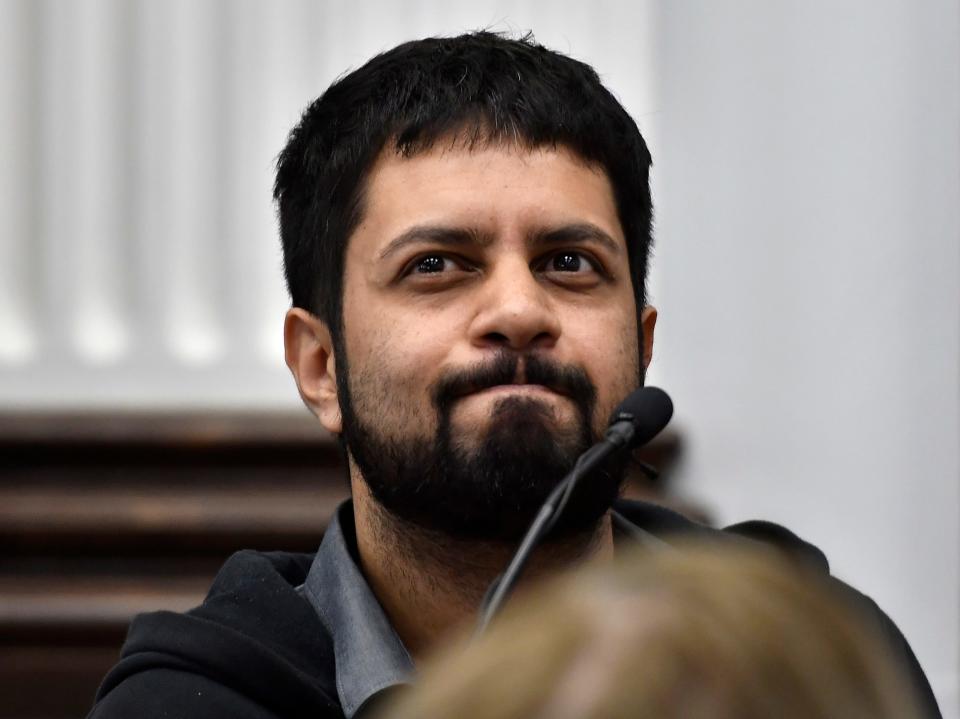Car lot owners testify they didn't ask Kyle Rittenhouse to protect property
KENOSHA, Wis. – Two brothers whose family owns three car lots downtown told jurors in Kyle Rittenhouse's homicide trial they never asked his group of armed men to protect their businesses or gave them permission to do so.
Some from that group have previously testified a friend of a friend of Rittenhouse's who used to work at Car Source had offered to help, and Anmol "Sam" Khindri accepted, and gave keys to get inside the repair shop and a ladder to get on the roof.
Khindri told jurors Friday he had no such conversations, nor did he offer keys to the shop. He recalled that early on Aug 25, 2020, Rittenhouse was among dozens of people who spoke to him with sympathy and encouragement after the family's main car lot had been burned on the first night of unrest.

Salil Khindri, his brother, also testified. He said he was working with a technician at the family's Car Source lot at 63rd Street and Sheridan Road when Rittenhouse's group of friends and some older men with rifles were mustering at the lot.
This would be where Rittenhouse later killed Joseph Rosenbaum.
Watch: Kyle Rittenhouse's judge dismisses juror over joke about police shooting of Jacob Blake
Know what’s up before you finish your cup. Sign up for the Daily Briefing morning newsletter.
Assistant District Attorney Thomas Binger asked, "So, all these guys are on your family's property and you don't ask them to leave?"
"Not when they're dressed like that," he said. He even posed for a picture with the group.
Defense attorney Corey Chirafisi suggested Anmol Khindri might be trying to avoid civil liability that might flow from allowing armed men on the family property, where someone was killed.
Khindri denied any such concern.
He seemed unclear and evasive to several more questions from Chirafisi about the extent of the business losses, whether it was insured or if the family had hired a lawyer to deal with the insurance company.
Khindri also seemed to be confused about who he might have seen where and when on Aug. 25th, but repeatedly maintained he made no efforts to obtain the protection of Rittenhouse's group.
"So, were you just willing to let your property be damaged on the 25th? You just resigned yourself to it?"
Khindri said he didn't know.
Earlier Friday, Kariann Swart, Rosenbaum's fiancee, testified he had returned to the motel where the couple had been living late in the afternoon of Aug. 25, after a hospital stay in Milwaukee. She said he took medications to control bipolar condition.
They talked into the evening, she said, before he left on foot around 9:30 p.m. She said she told him not to go downtown because of the unrest and curfew.
Rosenbaum was among crowds milling around on Sheridan Road about two hours later, acting very aggressive to others, according to several witnesses. He tried to start fires and at some point demanded the armed men shoot him.
One said Rosenbaum told him and Rittenhouse he would kill them if he ever saw either of them alone.
Not long after that, he chased Rittenhouse, who was alone, into the 63rd Street Car Source lot, where Rittenhouse shot him four times.
As he ran north after the shooting, Rittenhouse bumped into one of the older armed men he'd been with earlier in the night.
Jason Lackowski served five years in the Marines. He testified Friday he'd come from Brown Deer sometime after 10 p.m., with his AR-15 rifle, to help the community. He said he'd heard the shots while at 59th Street, and ran south.
He met Rittenhouse at the northern edge of the 63rd Street lot. He looked pale and frazzled and told Lackowski, "I didn't shoot anybody, but I need help."
Lackowski said he told Rittenhouse to go to the police, which had established a major presences at 60th Street. He said he started to go with him, but stopped and turned south when he heard more gunshots. Seconds later, more shots rang out from the north.
That's when, he said, he blacked out.
"Like lights on, but nobody home," he said.
On cross examination, Chirafisi, the defense attorney, asked if it wasn't more logical that Rittenhouse told him he had shot someone, and needed help.
Binger, the prosecutor, objected, noting Lackoski's testimony was consistent with his statement to the FBI soon after the events. The judge agreed the question was argumentative.
Lackowski said he also didn't hear several people yelling Rittenhouse had shot someone, only one statement of "Get him."
Nov. 3: Jurors see social media videos of Wisconsin shootings on Day 3 of Kyle Rittenhouse murder trial
Chirafisi asked if whoever the "him" was had something to worry about, given the crowd.
Lackowski said yes. He said he didn't conclude Rittenhouse could have shot someone, based on his non-aggressive behavior earlier that night.
The next thing Lackowski remembered was seeing Gaige Grosskreutz kneeling on the roadside, screaming for a medic. He had just been shot in the arm by Rittenhouse.
He said he helped apply a tourniquet until police came, and moved Grosskreutz into an armored car. He then warned off a bystander who was about to pick up Grosskreutz's handgun.
Lackowski took it, removed the magazine and emptied the chamber before handing it to police.
Lackowski had described being trained to "shout, shove, show, then shoot" when dealing with aggression or possible attack.
"Is run away or retreat in there?" Chirafisi asked, "Ever been trained to head for the hills?" Lackowski said "no."
Rittenhouse faces a count of reckless homicide in Rosenbaum's death, attempted intentional homicide for shooting Grosskreutz, and first-degree intentional homicide in the death of Anthony Huber.
Follow Bruce Vielmetti on Twitter: @ProofHearsay.
This article originally appeared on Milwaukee Journal Sentinel: Kyle Rittenhouse trial: Lot owners deny asking him to protect property

